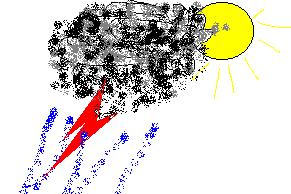Chemical Nature of Celestial
Bodies
(reference text)
DOUBT ?
SPECTROSCOPY

Auguste Comte(1798-1857)Also founder of Sociology
One of the most influential philosophers of the first
half of the nineteenth century. A prominent figure in Positivism which
has as a central tenet that scientists should not waste their time or energy
in attempts to answer unanswerable questions. He believed that stellar
astronomy, as opposed to planetary astronomy was a useless exercise because
we could never investigate the chemical composition of the stars.
In his Cours de philosophie positive (1830-42)
he wrote
" ... to attain a true idea of the nature and composition
of this science,
( astronomy) it is indispensable to set aside the
vague definitions of it that are still being given, and to
mark the boundaries of the positive knowledge that we are able to gain
of the stars.
Of the three senses that
reveal the existence of distant bodies , that
of sight is clearly the only one applicable to the celestial bodies.
Any research that is irreducible to actual visual observation
is necessarily excluded in regards to the stars,... we
can never by any means investigate their chemical composition...
the positive knowledge we can have of the stars is limited solely
to their geometrical and mechanical properties.
"It is therefore necessary
that we separate more completely than is commonly done the solar from the
universal point of view, the idea of the world
from that of the universe: the first is the highest we can actually
attain , and it is also the only one that truly interests us."
In his book Traite philosophique d'astronomie populaire
( 1844) he wrote
" in the eyes of those for whom science consists
of real laws and not of incoherent facts, the second( stellar astronomy)
exists only in name, and the first( solar astronomy) alone constitutes
the true astronomy; and I am not afraid to assert
that it will always be so.
Brief Chronology of Spectroscopy
(reference text)
-
1666 Isaac
Newton discovers the optical spectrum
-
1800 William Herschel discovers that energy
exist in the spectrum beyond the visible in the infra red region
-
1801 J. W. Ritter discovers ultra violet rays and
shows they produce chemical effects
-
1802 W. H. Wollaston discovers 7 dark lines in the
solar spectrum
-
1827 John Herschel color effects in spectra of flames
impregnated with various metallic salts
-
1828 Josef
Fraunhofer had already published papers describing over 500 dark lines
in the solar spectrum, showed that the lights from the planets and moon
exhibited the same pattern of lines, found the spectra of some stars differed
from the sun, discussed bright line spectra in relation to dark line spectra,
developed the diffraction grating.
-
1832 David Brewster discovers that a a dark
line spectrum is produced when a continuous spectrum passes through a gas
-
1847 John Draper discovers that an ignited
body yields a continuous spectrum and an ignited gas yields a broken spectrum.
Also finds that as the temperature of a body increases it gives off light
of higher frequency.
-
1859 Wilhelm Bunsen and
Gustav Kirchhoff establish spectrum analysis
as a reliable tool for investigating chemical composition
-
1859 Gustav Kirchoff publishes a study of
the chemical composition of the sun based on spectrum analysis.
-
1861 Kirchoff and Bunsen discover two new
chemical elements, cesium and rubidium by spectroscopic techniques. Later
many more new elements were discovered using this technique.
-
1864 William Huggins
using a spectroscope attached to a telescope establishes the gaseous nature
of nebulae.
-
1864 G. B. Donati discovers bright spectral lines
in comets
-
1868 Huggins discovers the shift in frequency predicted
by Doppler
-
which enables astronomers to measure velocities of objects
along the line of sight.
-
1868 Angelo Secchi produced a stellar spectral classification
with four categories.
-
1868 Jules Janssen and J. Norman Lockyer discover
helium first in the sun's spectrum
-
1872 Henry Draper makes the first photograph of a stellar
spectrum.
-
1890 Publication of the first Henry Draper Catalogue of
spectra of 10,000 stars divided into seven categories.
-
1895 Henry Rowland, using a diffraction grating records
a solar spectrum of 20,000 lines.
Spectroscopic Techniques
Modern studies of the universe have a wide range of
techniques available which extend well beyond the limits of optical spectroscopy.
In fact, these techniques extend beyond the electromagnetic spectrum.
-
optical astronomy
-
microwave astronomy
-
radio astronomy
-
infra red astronomy
-
ultra violet astronomy
-
x-ray astronomy
-
gamma ray astronomy
-
neutrino astronomy
-
cosmic ray studies
-
Gravitational waves detection
Reference Text
top of page
Modern Theories of the Universe: from Herschel
to Hubble, Michael J. Crowe,
Dover Publications, New York, 1994